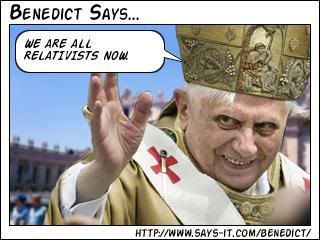A non-theistic concept of evil?
Thanks to SB for the link to this Frontpage interview with Christopher Hitchens on the topic of his book, god Is Not Great. I particularly liked this quote:
I also have come to the conclusion that religious belief, even in its supposedly benign form, is the clue to the origin of totalitarianism. A permanent inescapable surveillance; the abolition of the private thought; the constant guilt and fear; the irremovable and unchallengeable authority; the sado-masochism of begging for rewards and fearing punishments - this is the species at its most servile and primeval level. The wish for a Big Brother comes from the childhood of the race, and has to be outgrown in order for us to develop self-respect.Elsewhere in the interview he says something very interesting:
If you are a "pantheist", as the men I mentioned earlier (Spinoza and Jefferson and Einstein) probably or arguably were, you will agree with me that a god which is everywhere is just as likely to be nowhere in particular. If someone says that god is love I don't violently object. If he then says that love is god I find myself feeling uneasy. The undoubted existence of conscience - doing the right thing when nobody is looking, and even deriving satisfaction from the doing - need not posit the supernatural. I like to give blood when I can: I don't lose a pint but someone else gains one. I also hope to benefit when I need blood myself (I have a very rare blood group). Why intrude extraneous complexities here?What does he mean? I could understand if he was simply using the word "evil" to refer to that which he finds harmful or morally objectionable--or even that which he thinks we all should find harmful or morally objectionable. But he's describing "evil" here as something palpable--he has felt its presence--and that sounds like God-talk to me, or at least supernaturalism. If he objects to the idea that love is God, why would he, as an atheist, embrace the notion that evil is, if not Satan, then a "presence"?
As for evil, I say in the book that I believe in its existence and even feel that I have felt its presence. But this does not lead me to infer the existence of Satan and, as you well know, believers in god only complicate their ontology when they try (or fail) to do the same. [Emphasis added]
Perhaps he's simply framing his message for an audience--David Horowitz and the Frontpage readership--whose Rightwing comic-book worldview might not accommodate Hitchens' strident anti-theism unless he throws them a bone marked "But I Still Believe in Capital 'E' Evil" to reassure them that he's still on their side. (No offence to SB intended, btw.)
Or am I just misinterpreting him?

















|